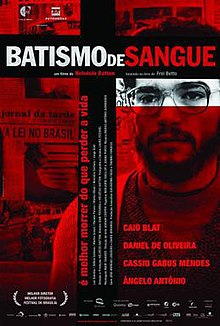Batismo de Sangue
| Baptism of Blood | |
|---|---|

Theatrical release poster
|
|
| Directed by | Helvécio Ratton |
| Produced by | Helvécio Ratton |
| Written by | Dani Patarra Helvécio Ratton |
| Based on | Batismo de Sangue by Frei Betto |
| Starring |
Caio Blat Daniel de Oliveira Cássio Gabus Mendes Ângelo Antônio |
| Music by | Marco Antônio Guimarães |
| Cinematography | Lauro Escorel |
| Edited by | Mair Tavares |
|
Production
company |
Quimera Filmes
|
| Distributed by | RioFilme |
|
Release date
|
|
|
Running time
|
94 minutes |
| Country | Brazil |
| Language | Portuguese |
| Budget | R$5 million |
| Box office | R$402,345 |
Baptism of Blood (Portuguese: Batismo de Sangue) is a 2006 Brazilian film directed by Helvécio Ratton, based on Frei Betto's book of the same name. Starring Caio Blat and Daniel de Oliveira as Frei Tito and Betto respectively, it follows the Dominican friars' resistance against Brazilian military dictatorship.
In 1968, the Dominican friars of São Paulo became part of the resistance against the military dictatorship in Brazil. Under the pseudonyms of "Tito", "Betto", "Oswaldo", "Fernando", and "Ivo", the friars join the Ação Libertadora Nacional, a communist guerrilla movement headed by Carlos Marighella. The friars' superior, Diogo, recommends them to be more careful, and they decide to disperse themselves.
Ivo and Fernando go to Rio de Janeiro but are intercepted and tortured by officers who accuse them for betraying the Church and Brazil. The officers ask about the place where they receive calls from their leader, and eventually they reveal it. After intercepting a conversation, the police headed by Sérgio Paranhos Fleury discover where Marighella will be and kill him. Meanwhile, Betto is captured in Rio Grande do Sul, and is arrested at the penitentiary Tiradentes in São Paulo along with the other friars.
The friars are later judged and sentenced to four years of imprisonment. Tito is the only who is released in exchange for the Swiss ambassador in Brazil, Ehrenfried von Holleben, being exiled in France. He is psychologically shaken by the fact that he was tortured, and also because his attempt of suicide during the torture sessions was labeled as a coward act by Fleury. In 1974, he commits suicide in Éveux.
...
Wikipedia
